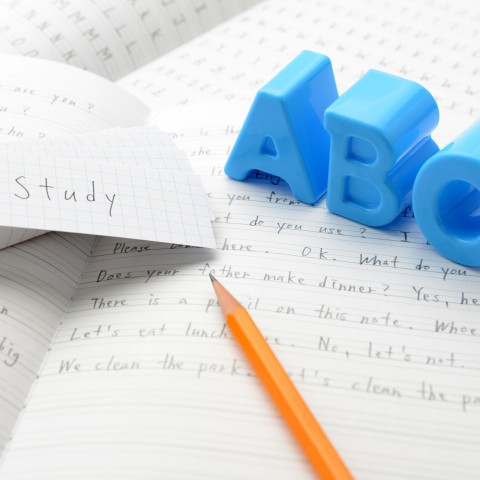
What is the backbone of every language? Definitely grammar.
Using proper grammar showcases your professionalism and respect for others.
Chinese grammar is rather unique. As opposed to English and the Romance languages which follow a strict structure, Chinese is often perceived by foreigners as not even having grammar. Others claim that Chinese grammar is extremely difficult.
As an art, the Chinese language has its own unique features and much flexibility in its grammar. If you’ve learned other languages before, you’ll find that learning Chinese grammar won’t be a typical language learning experience; there may be many new concepts that you’ve never even heard of.
Now, let’s dig into this Chinese grammar guide for beginners. Judge the language for yourself!
- → Don’t forget that ChineseClass101.com has plenty of other Chinese grammar lessons and pages. We highly recommend you check them out!
 Table of Contents
Table of Contents
- General Rules of Chinese Grammar
- Special Chinese Grammar Point #1: Particles
- Special Chinese Grammar Point #2: Different Modifiers
- Special Chinese Grammar Point #3: Formality
- Special Chinese Grammar Point #4: Common Adverbs
- Special Chinese Grammar Point #5: Common Verbs
- Special Grammar Point #6: Negative Sentences
- Conclusion
1. General Rules of Chinese Grammar

Learning new concepts may be challenging, but you will eventually ace them!
Welcome to the first reassuring rule of Chinese grammar: The structure of basic Chinese sentences is Subject-Verb-Object, just like in English. However, other special words, such as adverbs of time, have no fixed location in a sentence; you can put these words anywhere based on how much emphasis you want placed on them. In English, on the other hand, we usually only place words like this at the beginning or end of a sentence.
In Chinese grammar, questions can be formed without the use of interrogative adverbs (like “why” or “who”). You can simply say the statement with a rising intonation, sort of like you can do in informal English (“You ate all the cake?”).
The best part of Chinese grammar is that you don’t even need to worry about conjugating verbs; you can simply add specific words into the sentence to signify the tense.
Here’s a final tip for beginners: Remember that tones in Chinese can dramatically change the meaning of a word or sentence. Using the wrong tone for even a small word can be the difference between effective communication and total confusion. Keep practicing your spoken Chinese with native Chinese speakers and the language will eventually become a part of yourself!
Keeping these basic Chinese grammar rules in mind, let’s get to the more challenging parts of Chinese grammar!
2. Special Chinese Grammar Point #1: Particles

Never be afraid of asking questions when you encounter a difficulty.
One of the most interesting components of Chinese grammar structures is the question/exclamation particles. They’re typically placed at the end of a sentence to indicate either a question or an exclamation. Magical, right? Just one simple word, and the purpose and tone of your whole sentence transforms! Now, let’s see how to distinguish between the unfamiliar faces of our new friends.
1. Clause + 吗 (ma)
This particle is used to indicate that you require a yes/no answer to your question.
In Chinese: 明天的派对你还打算去吗?
Pinyin: Míng tiān de pài duì nǐ hái dǎ suàn qù ma?
In English: “Are you still planning to go to the party tomorrow?”
2. Clause + 吧 (ba)
This particle is used to make a suggestion.
In Chinese: 妈妈,你就放心让我一个人去旅行吧!
Pinyin: Mā ma, nǐ jiù fàng xīn ràng wǒ yī gè rén qù lǚ xíng ba!
In English: “Mom, please be reassured and let me go travel by myself!”
3. Clause + 呢 (ne)
This particle changes the emphasis on a topic.
In Chinese: 虽然姐姐比我大两岁,但是很多时候都是我在照顾她呢。
Pinyin: Suī rán jiě jie bǐ wǒ dà liǎng suì, dàn shì hěn duō shí hou dōu shì wǒ zài zhào gù tā ne.
In English: “Even though my sister is two years older than me, I am the one who takes care of her most of the time.”
4. Clause + 啊 (a)
This particle is used to express exclamation in a statement.
In Chinese: 你家可真漂亮啊!
Pinyin: Nǐ jiā kě zhēn piāo liàng a!
In English: “Your house is so pretty!”
5. Clause + 啦 (la)
This particle is used to add a relaxed tone in an exclamatory sentence.
In Chinese: 不要担心我啦。
Pinyin: Bú yào dān xīn wǒ la.
In English: “Don’t worry about me.”
6. Clause + 嘛 (ma)
This particle is used to place emphasis on an overt fact.
In Chinese: 今天雨下得这么大,我怎么可能还出去买菜嘛。
Pinyin: Jīn tiān yǔ xià de zhè me dà, wǒ zěn me kě néng hái chū qù mǎi cài ma.
In English: “The rain is incredibly heavy today, there is no way I am still going to buy groceries. ”
Additional notes: As you may have noticed above, these particles don’t possess a tone; they’re simply indicated as “light-sounding” in Chinese. All of these particles can also be used in declarative sentences, as well as exclamatory and interrogative sentences depending on how strong the expression is.
3. Special Chinese Grammar Point #2: Different Modifiers
There are three general modifiers that are used in daily conversations, which are: 的 (de), 得 (de), and 地 (de). While they have the same pronunciation, each one is used differently. It may take some time to digest, but they’re fairly straightforward to learn. Don’t be afraid. Just take on the challenge!
1. Subject + 的 (de) + Object
This modifier may be one of the easiest to understand as you can literally translate it to “of.” It indicates a sense of ownership.
In Chinese: 这是我的书。
Pinyin: Zhè shì wǒ de shū.
In English: “This book is mine.”
2. Attribute + 的 (de) + Noun
In Chinese: 我哥哥是一个很有雄心壮志的人。
Pinyin: Wǒ gē ge shì yī gè hěn yǒu xióng xīn zhuàng zhì de rén.
In English: “My older brother is someone who is very ambitious.”
3. Verb + 得 (de) + State
In Chinese: 这支舞她跳得可真美。
Pinyin: Zhè zhī wǔ tā tiào de kě zhēn měi.
In English: “This dance she is performing is beautifully done.”
4. Adjective + 地 (de) + Verb
In Chinese grammar, many adjectives can function as adverbs when they modify verbs, without changing their form.
In Chinese: 勇敢地前进吧,我会永远支持你的。
Pinyin: Yǒng gǎn de qián jìn ba, wǒ huì yǒng yuǎn zhī chí nǐ de.
In English: “Just bravely go for it, I will always be there for you. ”
4. Special Chinese Grammar Point #3: Formality

A polite person always draws people closer.
Don’t panic just yet. This is a very straightforward but important point in Chinese grammar. As a people that values politeness and formality, the Chinese use two different forms to express “you.” One is more polite, to be used with people whom you need to show more respect such as your elders or mentors. The other one can be casually used with peers and friends.
1. The polite form: 您 (nín)
In Chinese: 奶奶,您最近身体还好吗?
Pinyin: Nǎi nai, nín zuì jìn shēn tǐ hái hǎo ma?
In English: “Grandma, how has your health been recently?”
2. The casual form: 你 (nǐ)
In Chinese: 谢谢你一直以来的陪伴。
Pinyin: Xiè xie nǐ yī zhí yǐ lái de péi bàn.
In English: “Thank you for always keeping me company.”
5. Special Chinese Grammar Point #4: Common Adverbs

Still bewildered about Chinese grammar? Leave your questions in the comments below and we’ll get back to you!
Now that we’ve gone over some basic Chinese grammar rules, let’s dive in deeper with a list of the most common adverbs to make your sentences even more complete. Keep in mind that while these words are considered adverbs in Chinese, they may be of a different part of speech when translated into English.
1. Able to: 会 (huì)
In Chinese: 她五岁就会做饭了。
Pinyin: Tā wǔ suì jiù huì zuò fàn le.
In English: “She was able to cook ever since she was five years old.”
2. Allowed to/Could: 能 (néng)
In Chinese: 请问我能去一下你家的卫生间吗?
Pinyin: Qǐng wèn wǒ néng qù yī xià nǐ jiā de wèi shēng jiān ma?
In English: “Could I please (Am I allowed to) go to the bathroom at your house?”
3. Also: 也 (yě)
In Chinese: 我原本也想买这本书。
Pinyin: Wǒ yuán běn yě xiǎng mǎi zhè běn shū.
In English: “I was also thinking about buying this book. ”
4. Still: 还 (hái)
In Chinese: 我还是很怀念大学的时光。
Pinyin: Wǒ hái shì hěn huái niàn dà xué de shí guāng.
In English: “I am still nostalgic about my college times.”
5. Too: 太 (tài)
In Chinese: 你弹钢琴的样子实在是太迷人了。
Pinyin: Nǐ tán gāng qín de yàng zǐ shí zài shì tài mí rén le.
In English: “The way you play the piano is honestly way too attractive.”
6. Very: 很 (hěn)
In Chinese: 我家有一个很大的游泳池。
Pinyin: Wǒ jiā yǒu yī gè hěn dà de yóu yǒng chí.
In English: “There is a very big swimming pool in my house.”
6. Special Chinese Grammar Point #5: Common Verbs
Verbs are one of the most important parts of speech, so it’s crucial that you know the most common ones and how to use them.
1. To have / To possess: 有 (yǒu)
In Chinese: 我家有一只很可爱的小狗。
Pinyin: Wǒ jiā yǒu yī zhī hěn kě ài de xiǎo gǒu.
In English: “I have a very cute doggie at home.”
2. To be somewhere: 在 (zài)
In Chinese: 你给我打电话的时候我正在外面。
Pinyin: Nǐ gěi wǒ dǎ diàn huà de shí hou wǒ zhèng zài wài mian.
In English: “I was outside when you were calling me. ”
3. To be: 是 (shì)
In Chinese: 她是一个特别内向的人。
Pinyin: Tā shì yī gè tè bié nèi xiàng de rén.
In English: “She is a very introverted person.”
4. To go: 去 (qù)
In Chinese: 我最好的朋友邀请我今天去她家吃饭。
Pinyin: Wǒ zuì hǎo de péng you yāo qǐng wǒ jīn tiān qù tā jiā chī fàn.
In English: “My best friend invited me to go and eat at her place today.”
5. To come: 来 (lái)
In Chinese: 不管他来我家多少次,都永远记不住路。
Pinyin: Bù guǎn tā lái wǒ jiā duō shǎo cì, dōu yǒng yuǎn jì bú zhù lù.
In English: “No matter how many times he came to my house, he will never remember the directions.”
7. Special Grammar Point #6: Negative Sentences
There are two words that can be used to form a negative sentence: 不 (bù) and 没 (méi). Remember that these are not interchangeable and have different usages.
1. Subject + 不 (bù) + Verb
Use this structure to indicate that you don’t want to do something (or that you just won’t do it).
In Chinese: 我是不会出国留学的。
Pinyin: Wǒ shì bú huì chū guó liú xué de.
In English: “I won’t go study abroad.”
2. Subject + 不 (bù) + Verb
This structure can be used to say that someone is not in the habit of doing something.
In Chinese: 我不喜欢熬夜。
Pinyin: Wǒ bù xǐ huan áo yè.
In English: “I don’t like to stay up late.”
3. 不 (bù) + Adjective
This structure expresses the negation of an adjective.
In Chinese: 她觉得自己不好看。
Pinyin: Tā jué de zì jǐ bù hǎo kàn.
In English: “She thinks she is not pretty.”
4. Subject + 没(有)(méi yǒu) + Verb + Object
Use this structure to negate actions in the past or future.
In Chinese: 我没去打篮球。
Pinyin: Wǒ méi qù dǎ lán qiú.
In English: “I didn’t go play basketball.”
In Chinese: 我还没吃饭呢。
Pinyin: Wǒ hái méi chī fàn ne.
In English: “I haven’t eaten yet.”
5. Subject + 没有 (méi yǒu) + Verb + Object
This structure is used to indicate that you don’t have something.
In Chinese: 抱歉,我没有多余的笔。
Pinyin: Bào qiàn, wǒ méi yǒu duō yú de bǐ.
In English: “Sorry, I don’t have an extra pencil.”

Spare some time every day to study a language, and you will certainly improve over time!
8. Conclusion
Now take a deep breath. Have you gotten used to these basic Chinese grammar rules? If you’re still struggling with something, don’t worry. Learning a new language is like embracing a new lifestyle; only when you gradually integrate it into your daily life will you be able to master Chinese.
Of course, we couldn’t include everything about Chinese grammar here—there’s so much more that’s worth exploring. ChineseClass101 is honored to share with you our large pool of Chinese grammar resources, language and culture lessons, and other effective learning materials. We’re here to assist you and help you succeed in your language learning journey. If you want to bring yourself to the next level, don’t hesitate to create your free lifetime account today!
If you have any questions about what we went over today, feel free to leave us a comment. We’ll get back to you with useful information!










